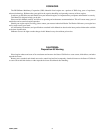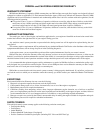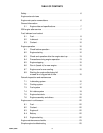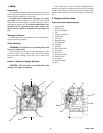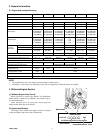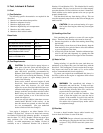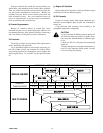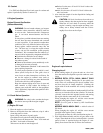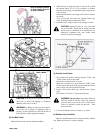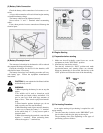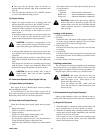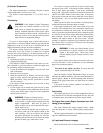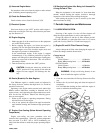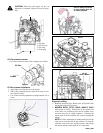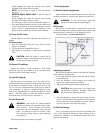
10 109821_0508
5.3 Coolant
Use 50/50 mix Ethylene Glycol and water for coolant and
replace it periodically. (Refer to section 8.2)
6. Engine Operation
Engine Exhaust Gas Caution
(Carbon Monoxide)
WARNING: Do not breathe exhaust gas because
it contains carbon monoxide, which by itself has
no color or odor. Carbon monoxide is a dangerous
gas. It can cause unconsciousness and can be
lethal.
If at any time you think exhaust fumes are entering
the cab, have the cause determined and corrected
as soon as possible. If you must drive under these
conditions, drive only with all windows fully open.
Protect against carbon monoxide entry into the
cab. The best way is to keep the engine exhaust
system, cab and cab ventilation system properly
maintained. We recommend that the exhaust sys-
tem and cab be inspected by competent technician:
● Each time the vehicle has an oil change.
● Whenever a change is noticed in the sound of
the exhaust system.
● Whenever the exhaust system, underbody or cab
is damaged or becomes corroded.
See the "Maintenance Schedule" in this manual for
parts requiring inspection.
To allow proper operation of your vehicle's venti-
lation system, keep the air inlet grille clear of
snow, leaves or other obstructions at all times. Do
not run the engine in confined areas (such as
garages or next to building) any more than needed
to move the vehicles or the equipment.
Keep the exhaust tailpipe area clear of snow and
other material to help reduce the buildup of
exhaust gases under the vehicle or the equipment.
This is particularly important when parked in bliz-
zard conditions.
6.1 Check Before Operation
WARNING: For safety's sake, conduct the inspec-
tion before start-up with the engine stopped.
(1) Engine Oil Level
1. Place the engine on a level surface.
2. Remove the dipstick from the crankcase, wipe it with a
clean shop towel or cloth.
Insert it fully and remove it gently again.
Check the oil level by the level marks on the dipstick.
The oil level must be between the "Max." level mark and
the "Min." level mark as illustrated.
Take care not to add too much engine oil.
● Drain oil to the max. oil level if oil level is above the
max. level mark.
● Add oil to the max. oil level if oil level is below the
min. level mark.
3. Also check the sample oil on the dipstick for fouling and
degrees of viscosity.
CAUTION: Oil level check must be made ten or
twenty minutes after the engine has been stopped.
When the oil level check is necessary while the
engine is running, stop the engine and keep it sta-
tionary ten or twenty minutes until the oil thor-
oughly flows down to the oil pan.
Engine oil replenishment
Changing the oil
1. Before adding engine oil, place the unit on a level sur-
face, then remove the dipstick to provide crankcase venti-
lation.
2. MODELS E673L, S773L, N844L, N844L-T ONLY
Add engine oil slowly. Pouring the oil too quickly can
result in the oil overflowing into the air breather valve
and then into the air intake manifold. Cranking the
engine with oil in the manifold will severely damage the
engine.
NOTE: If oil has entered the air intake manifold it will be
necessary to clean the oil from the cylinders. To clean the
cylinders, remove the fuel injection nozzles and turning
the engine with the starter until all oil is exhausted.
When changing the engine oil, add the exact amount
specified in the engine owner’s manual.
NOTE: Use CD grade or better by API classification
engine oil.
MODELS N843 & N843L ONLY — Add oil at the oil
fill shown.
When changing the engine oil, add the exact amount
specified in the engine owner’s manual.
Use CD grade or better by API classification engine oil.
3. Wait about fifteen minutes until the oil gets down to the
oil pan. Then check the oil level with a dipstick. A certain
period of time is required before the engine oil com-
pletely flows down from the oil filler to the crankcase.
Max. Level
Min. Level




